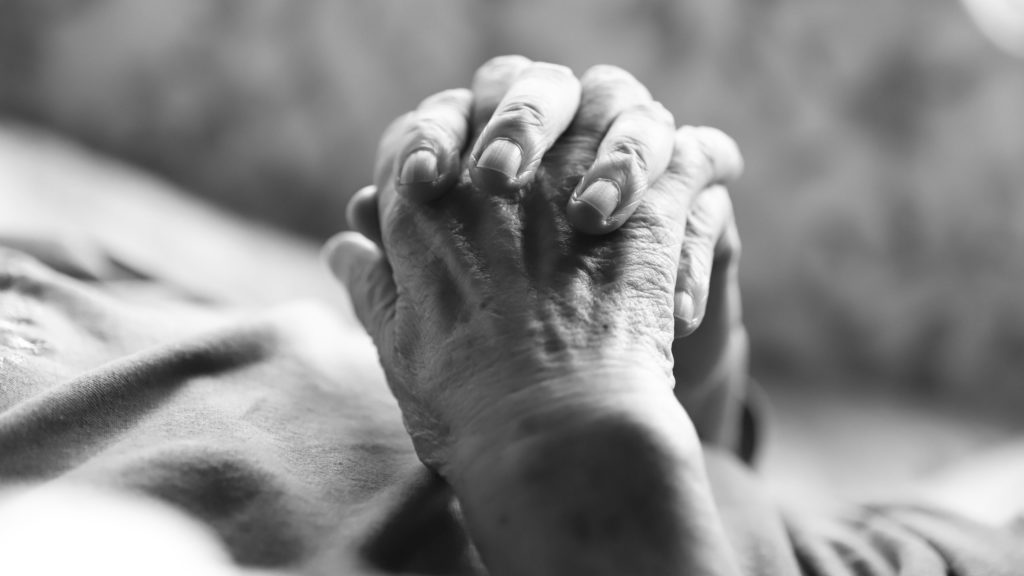For the first time in several years, my mom called me by name. We were turning her in her bed, which is a group effort, when she looked up at me and called me “Greg.”
My mom is bed-ridden now, yet still lives at home at age 99. This is a kind of a miracle in itself, and is only possible because of my generous and loving siblings, a saintly sister-in-law and a couple of dedicated caregivers. Yet the dementia that comes with age’s frailty has taken its toll. The arc of her human journey has bent back almost to where it began.
The children who she once fed now feed her. The children who she once changed, now change her. The children who she once helped take their first steps now carefully lift her up from the bed, standing her on wobbly legs as they position her in a wheelchair. She who gave so much is now giving us a final opportunity to give back, to answer love with love.
The fragility and helplessness of the young child is now hers to endure, with skin worn almost translucent by the passage of years.
The woman strong enough to learn how to play 18 holes of golf in her 50s now seems to be all painful sinews and joints, flesh barely covering the bones of her hands that once gripped those clubs with such determination.
And despite all this, she has good days as well as bad ones, lighting up when a familiar face enters the room. She still smiles. She blows kisses. She says she loves each of us madly.
When some unpleasantness is being inflicted on her, one of the children who she taught to pray will look her in the eyes and start reciting the Our Father or the Hail Mary.
Mom mouths the same words, words so deeply embedded in her they are unforgettable. Or she would repeatedly pray, “Lord, thank you for my blessings and graces.”
It seems an injustice that after so many decades of love and service, she must endure her Good Friday now, sometimes with loud cries and tears, sometimes with prayers and supplications, as the author of the Letter to the Hebrews puts it.
My mom is a living memento mori, a reminder of the path we all will travel, perhaps not for 99 years, but travel nonetheless we will.
“I say to you, when you were younger, you used to dress yourself and go where you wanted; but when you grow old, you will stretch out your hands, and someone else will dress you and lead you where you do not want to go” (John 21:18). Jesus wasn’t just foretelling Peter’s end, but the likely end of so many of us as well.
It is sometimes easier to believe in Good Friday than in Easter Sunday when in my mom’s bedroom, but not only there: in the muddy charnel house of Bakhmut, in the 18-wheelers filled with the bodies of migrants risking all in the failed hope of a new life, in the gunshot victims on a thousand U.S. streets.
It is not difficult in these darkening hours to believe in Good Friday. It is an act of courage, of faith, to believe in Easter Sunday. “I look forward to the resurrection of the dead and the life of the world to come,” we say every Sunday in the Creed. That fantastical assertion is based on our faith that Christ did indeed rise again. “Death no longer has power over him” (Romans 6:9), Paul wrote. And because of our faith in Christ, death no longer has power over us. In faith, we look forward to the resurrection of the dead.
Looking upon the body of my sleeping mother, a sleep that even now resembles death, I am speechless at the impenetrable mystery of it. That’s because of the sacrifice one God-man made 2,000 years ago, a sacrifice memorialized every single day since then, my mother’s life does not end here. In her end will be a beginning.
I do not know what life beyond death will entail. Will she be transformed as Jesus was in the post-resurrection appearances? Will that vital woman who birthed eight children, who taught me to pray, to garden, to cook, to care, will she be restored to something altogether new, yet recognizable?
What will 99 years of life come to be in the afterlife? I don’t know the answer to that. Yet, I believe that ours is “an inheritance that is imperishable, undefiled and unfading” (1 Peter 1:4), as Peter wrote.
Even now, as my mom climbs her last Golgotha, in her love and her patience and her faith, she points toward Easter’s dawning and immortal light.

